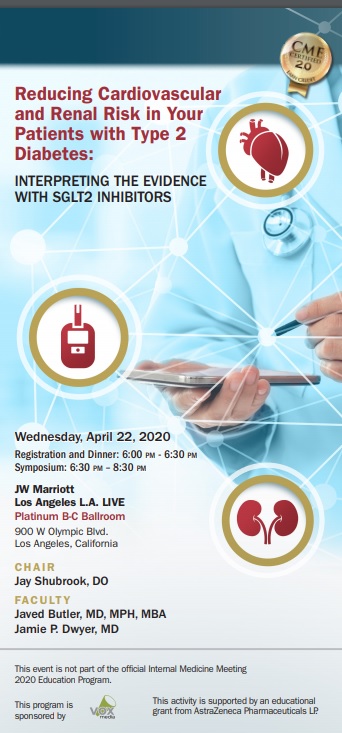 |
Wednesday, April 22, 2020
Registration and Dinner: 6:00PM - 6:30PM
Symposium: 6:30PM - 8:30PM Venue: JW Marriott Los Angeles L.A. LIVE Platinum B-C Ballroom 900 W Olympic Blvd. Los Angeles, California Faculty: Jay Shubrook, DO (Chair); Javed Butler, MD, MPH, MBA; Jamie P. Dwyer, MD Registration for this program is now closed. |
Interpreting the Evidence with SGLT2 Inhibitors
|
Note:This event is not part of the official Internal Medicine Meeting
2020 Education Program. Program Overview: Internists play an integral role in the prevention and treatment of macrovascular and microvascular complications in their patients with type 2 diabetes. At the front line of diabetes management, they are well-positioned to recommend to their patients therapies--SGLT2 inhibitors and GLP-1 RAs--which have been demonstrated in clinical trials, and recommended in guidelines and scientific statements from diabetes and cardiovascular societies, to reduce cardiorenal risk. With the rapidly growing body of evidence with SGLT2 inhibitors, there is a need for internists to interpret the latest findings and the resultant changes in recommendations, and apply the evidence and recommendations in clinical practice. In addition to prescribing SGLT2 inhibitors for treatment of hyperglycemia, internists can help ensure that their patients with type 2 diabetes have a reduced risk of atherosclerotic cardiovascular disease (ASCVD) by prescribing them as recommended in primary prevention guidelines from the American College of Cardiology (ACC) and American Heart Association (AHA). Internists can utilize SGLT2 inhibitors to reduce the risk of development of nephropathy in their patients with type 2 diabetes; benefits have been observed in cardiovascular outcomes trials (CVOTs) in patients with normal or only mildly reduced renal function. In addition, effectiveness in reducing the risk of hard renal outcomes has been published with SGLT2 inhibition in patients with chronic kidney disease (CKD). In patients with established ASCVD, SGLT2 inhibitors have demonstrated reductions in the risk of major cardiovascular events (MACE). Diabetes is a risk factor for heart failure (HF); prevention of HF has been demonstrated with SGLT2 inhibitors in multiple clinical trials. A clinical trial of patients with HF has indicated the benefit of a SGLT2 inhibitor for treatment of HF in patients with and without diabetes. The American Diabetes Association (ADA) now recommends SGLT2 inhibitors--independently of baseline A1C or individualized A1C target--for patients with indicators of high risk or established ASCVD, CKD, or HF. Internists need to ensure that their patients are taking these medications, through direct recommendations with their patients or in their multidisciplinary, collaborative interactions. In this educational initiative, experts from primary care, cardiology, and nephrology will interpret the latest findings, elaborate current recommendations, and describe best practices for the use of SGLT2 inhibitors. |
|
|
Educational Objectives:
Target Audience: This educational activity is intended for internists and other primary care providers. Educational Grant: Voxmedia International gratefully acknowledges the educational grant provided by AstraZeneca Pharmaceuticals LP Accreditation and Credit Designation Statements: Voxmedia LLC is accredited by the Accreditation Council for Continuing Medical Education (ACCME) to provide continuing medical education for physicians. Voxmedia LLC designates this live activity for a maximum of 2.0 AMA PRA Category 1 Credit(s)TM. Physicians should claim only the credit commensurate with the extent of their participation in the activity. Nurse practitioners may participate in this educational activitycand earn a certificate of completion as AANP accepts AMA PRA Category 1 CreditsTM through its reciprocity agreements. The National Commission on Certification of Physician Assistants accepts AMA PRA Category 1 CreditsTM from organizations accredited by the ACCME. Disclosure Statement: It is the policy of Voxmedia to ensure fair-balance, independence, objectivity, and scientific rigor in all directly or jointly sponsored educational activities. All prospective faculty are required to disclose any significant financial, other interest or relationship (1) with any commercial interest producing, marketing, re-selling, or distributing health care goods or services consumed by, or used on, patients AND (2) with any commercial supporters prior to participating in the planning of an activity or developing content. Only then may faculty receive approval to participate, and are expected to contribute evidence-based material and information. Faculty are required to indicate areas of their presentation that are based on professional opinion vs. guidelines, meta-analysis etc. All information submitted will be peer-reviewed. Americans with Disabilities Act Voxmedia fully complies with the legal requirements of the ADA and the rules and regulations thereof. If any participant of this activity is in need of accommodation, please call and/or submit in writing to: Voxmedia, 454 Morris Avenue, Springfield, New Jersey 07081 USA; Phone: 973-467-0500. | |

